College of Human Sciences
A passion for bringing change
Professor Patrone Risenga, from the Department of Health Studies in the College of Human Sciences, recently presented her paper during her inaugural address titled Can nurses afford to meet the health needs of community members without understanding indigenous knowledge systems? Health for all in South Africa. Ledile Nnana Jege sat down with Risenga to learn more about her life, career and what inspires her dedication towards serving others.
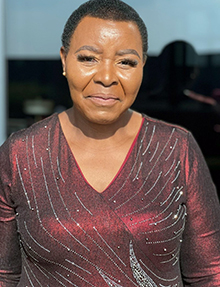
Professor Patrone Risenga
Q: Where were you born?
A: I was born and bred in the Tiyani village in Limpopo province. I am the third child of the late Maria Tlherisa Chauke and George Mkhacani Chauke, and I have three siblings. My late husband and I are blessed with five children – three girls and two boys.
Q: What motivated you to study further? Has it always been your dream to become an academic?
A: I grew up very poor, with only one school uniform and no school shoes. When my father passed away when I was nine years old, my mother started working as a nanny, and we were left under my grandmother's supervision. My mother also passed away a few years later, and we were orphaned. My sister married at 17, hoping she could help us, her siblings. I vowed to God that my childhood journey would not become that of my children. Early on, I realised that education was the only way to emancipation. So, I continued studying regardless of our family's many challenges, knowing things would change for the better one day.
Q: You recently delivered your inaugural address as a professor; what inspired you to conduct research in the field?
A: I investigated whether nurses can afford to meet the health needs of community members without understanding indigenous knowledge systems in their quest to deliver health services for all in South Africa. I learnt that, as nurses, we have become westernised to the extent of forgetting our points of origin. In that way, we lose ourselves. I aim to help nurses develop cultural sensitivity and competency by becoming more aware of their surroundings. Nurses must be mindful of – and reflect on – their cultural perspectives. Cultural awareness and the ability to properly care for cultures other than ours begin with being attentive, listening respectfully, and carefully observing cues. This will help nurses value one another and the patients and clients who come to us for help with their health challenges. Lastly, restoring morality in the profession is critical because we are dealing with human beings.
Q: Where does your passion for community engagement come from?
A: I am guided by the principle of Ubuntu, which calls on us to show humanity to others. Loosely translated, I am what I am because of who we all are. It helps me look at any person respectfully. Since we are all interconnected and gain meaning from those around us, no human being can be said to exist in isolation. Building coalitions and working together provides us, citizens, with opportunities to learn new skills and craft complex solutions to some of the critical issues affecting the most disadvantaged. My passion comes from bringing about change while learning from various communities.
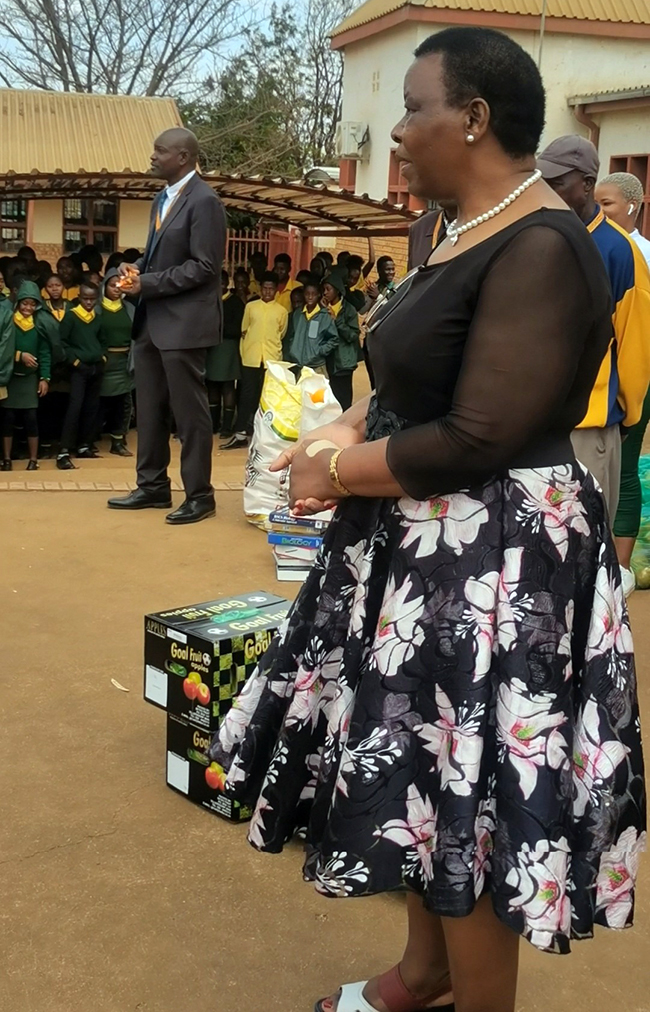
Prof Patrone Risenga (floral skirt) motivating learners from Mahonisi High School during a community engagement visit
I realised that all communities have a wealth of undocumented information. The crucial point is organising public engagement and participation to influence the social and political landscape to bring about change. As an academic with the mandate of engaging with communities, I realised that we must join hands with community members to address their health-related problems. That means community members need to be actively involved and given a chance to shape any decisions that will impact them. Furthermore, they should determine the extent of their engagement or group's involvement rather than allowing other forces to dictate it.
Innovative solutions are created when grassroots organisations join academics and professional associations to develop workable fixes for society's recurring issues. Once we understand the importance of such engagement, we can make a difference in people's lives at the community level, which is crucial for primary prevention in the health sector. Another reason I enjoy community engagement is the possibility of partnering with different organisations to effect change at the grassroots level.
Handing over 46 boxes of books to Mahonisi village schools (George Sonto High and Mahonisi Primary) earlier this year made me realise that the presence of a university in a village – through community engagement – can indeed make a difference.
Q: Researching and maintaining a work-life balance can take its toll. From where do you draw your strength?
A: Regular research is crucial for any academic. I have a schedule of work which is clearly set out, but I also schedule a time to unwind, interact with others, and exercise. For example, I might stroll and have coffee with a friend. I inform my family about my research and enjoy discussing various topics with them. Creating a support system and involving my family in my research aims have enabled me to succeed. Lastly, I always make time to be a mother to my children and a grandmother to my grandchildren.
Q: What inspired you to have the desire to be part of the SHIP project?
A: After joining Unisa in 2013, I worked with Professor Olga Makhubela-Nkondo on the Strategic Health Innovations Partnership (SHIP) project, particularly on community nursing. SHIP was developed by the Basic Education and Health departments and jointly implemented to ensure coverage of school health services amongst all learners in primary and secondary schools.
SHIP's strategic objectives are to increase knowledge and awareness of health-promoting behaviours; develop systems for mainstreaming care and support for teaching and learning; increase sexual and reproductive health knowledge; and strengthen skills and decision-making among learners, educators and school support staff in this country. This programme offers a comprehensive and integrated package of services, including sexual and reproductive health services for older learners.
A significant component of SHIP's health services package is devoted to health education in each of the four school phases (for instance, teaching learners how to lead a healthy lifestyle and raising drug and substance abuse awareness), undertaking health screenings (vision, hearing, oral health, TB) and offering onsite services (e.g. deworming and immunisation). SHIP's services thus contribute to the health and well-being of learners by screening them for any health-related barriers to learning.
As an academic, I need to respond to the government's call to play my part in addressing the needs of our country. That made me realise what challenges our nation's children face, growing up in an environment characterised by drugs, abuse in all forms, and the degeneration of moral values. I felt a need to make a difference in their lives. The growing number of teenage pregnancies amongst primary and secondary school learners came as a blow to me. To me, talking to boys and girls is a worthwhile undertaking. After all, children – as the future of our nation – must be protected so that we can shape a better country.
Q: As a health professional, what is the one thing you wish could be changed in our healthcare system?
A: Health cannot serve as the catchphrase of a movement. Everyone deserves and has a right to access the highest standards of healthcare. That idea should be used as an organising principle. Unfortunately, many people in our country still do not have access to health institutions: at best, they might only see a mobile clinic visiting their community for four to five hours a month. We need to make health accessible to all, not just locally but also globally. Clarity regarding the opportunities and challenges that have hindered (and, in some cases, reversed) progress in addressing the health needs of all is necessary for attaining that goal. Right now, we have a real chance to make strides to help millions of people live longer, healthier lives, transform hopelessness into optimism, and lay the groundwork for future generations to enjoy better health.
Q: In 2023, Unisa will be celebrating its 150 years. Looking back at your journey as an employee, would you say you have fulfilled the university's vision of shaping futures in the service of humanity? If so, in what way?
A: Yes, I am still moving in the right direction, shaping the future of other human beings through teaching and learning, research, community engagement, citizenship, and academic leadership. We educate students and communities so that they will have the wisdom, knowledge and skills to make a difference in the world. We donate books as a community engagement initiative to touch young ones' lives and encourage them to read so they can access knowledge. Donating school uniforms helps a child who might not attend school due to familial poverty, to be able to stand up and say: "Yes, I will also make it." That source of motivation, that fire, needs to be carried into the future by those young people and the lives they touch.
Doing research that makes a difference in the world helps to shape the future, as does teaching people the necessary skills to build a better world. It is equally important to learn from others to become a better academic and ensure that the university's image is never jeopardised. We respect our students by responding to their learning needs to ensure they grow personally and professionally.
Q: Lastly, what legacy do you want to leave behind in the healthcare profession?
A: Every person's health matters. Health professionals should understand their mandate of treating patients in totality and tap into indigenous knowledge systems with their wealth of information. We must learn to appreciate what we have and utilise it to the fullest.
Ubuntu has the advantage of not forcing one person to decide for others. Instead, it emphasises that, while it is good to follow your own goals and desires, it is equally crucial to remember that no man is an island, entire of itself; as Donne said – humanity is interconnected. We need to move away from having only educated healthcare workers to embrace healthcare workers who are both educated and wise.
* Complied by Ledile Jege: Communication and Marketing Specialist, College of Human Sciences
Publish date: 2022-11-25 00:00:00.0


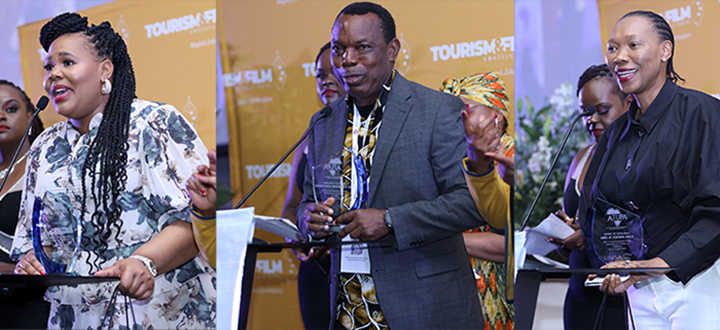 Unisa and ATUPA recognise researchers for ingenuity and innovation
Unisa and ATUPA recognise researchers for ingenuity and innovation
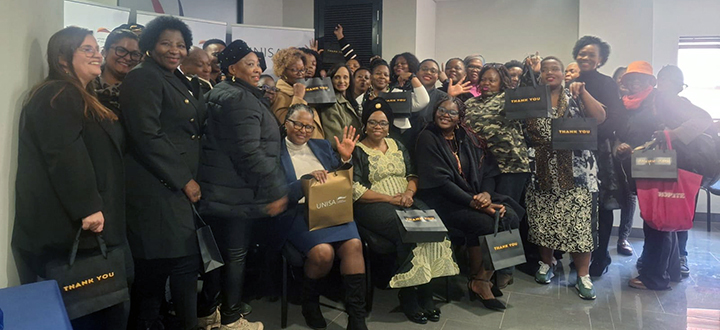 Recognising the unceasing resilience of women
Recognising the unceasing resilience of women
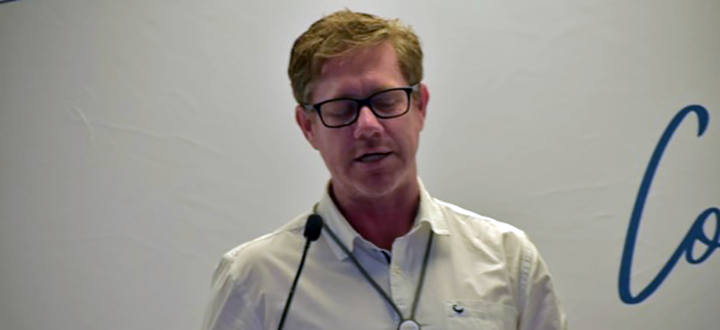 Unisa and SHECASA promote institutional health and safety
Unisa and SHECASA promote institutional health and safety
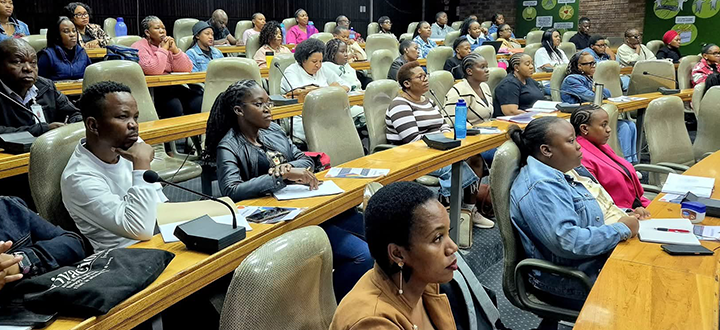 Effectual partnership to advance public health knowledge
Effectual partnership to advance public health knowledge
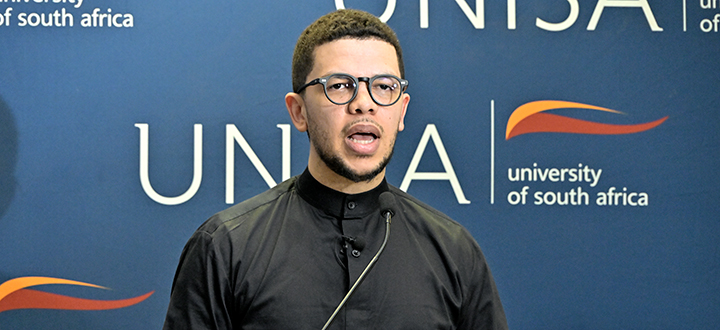 OR Tambo remembered as a radical democracy builder
OR Tambo remembered as a radical democracy builder